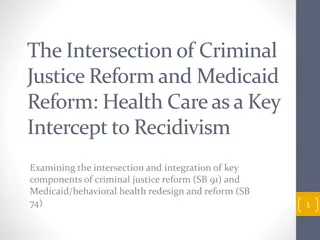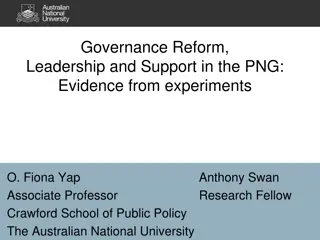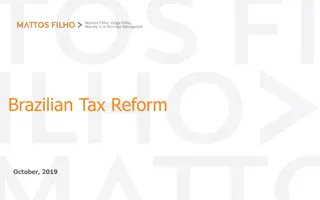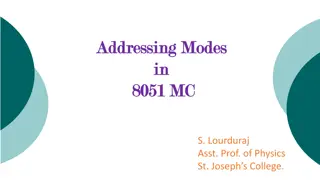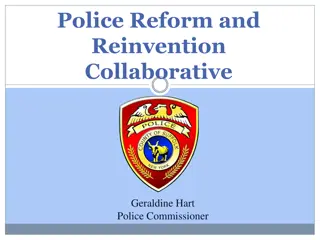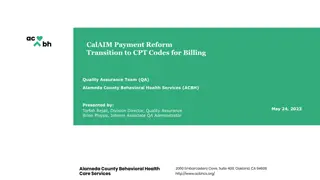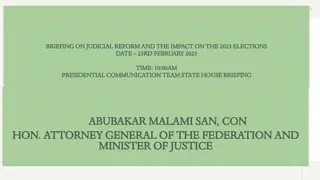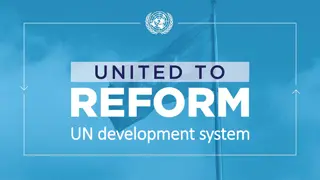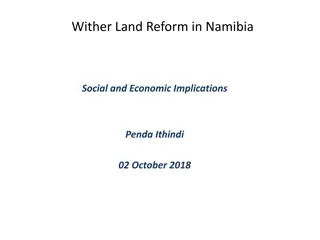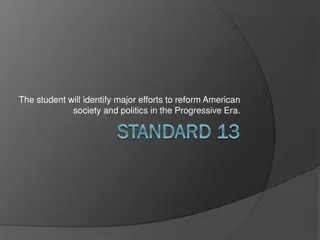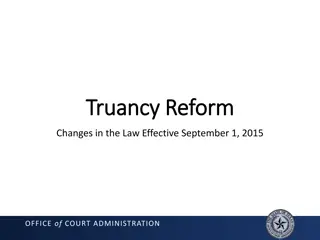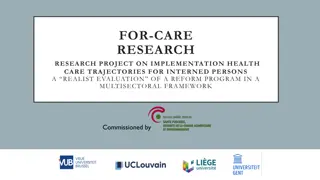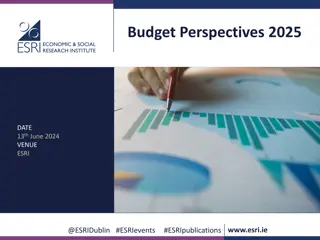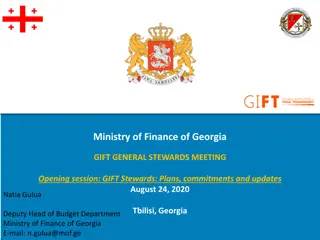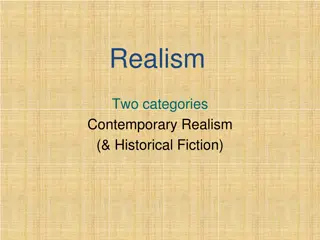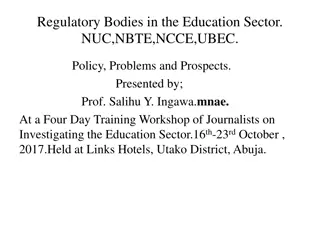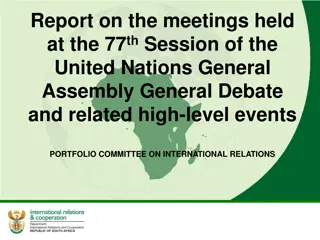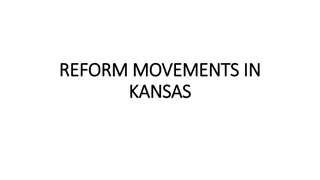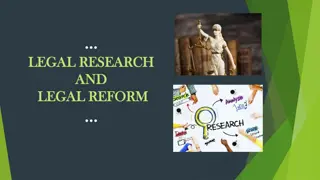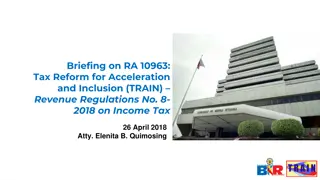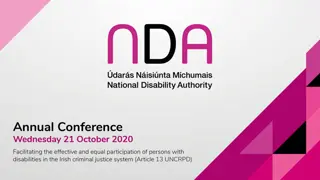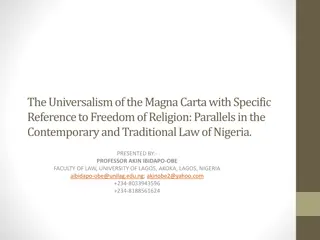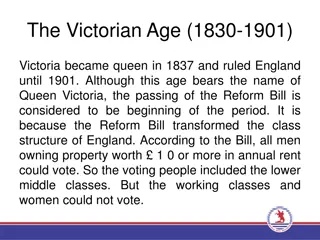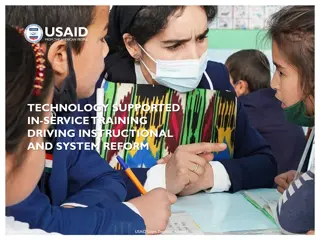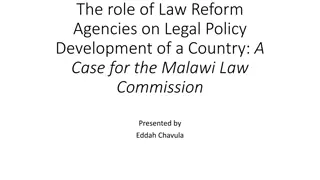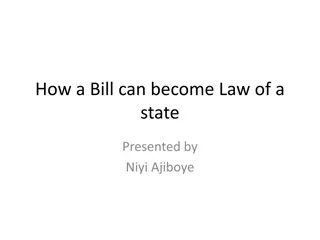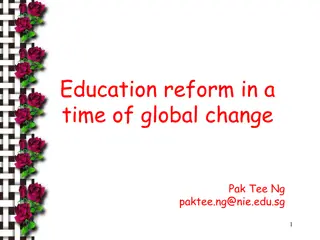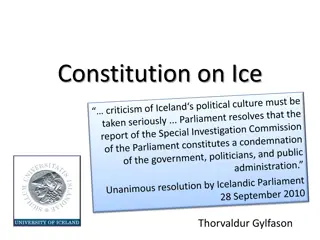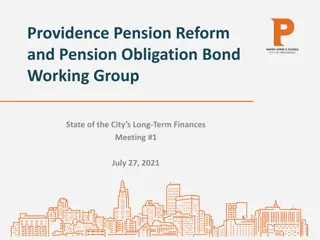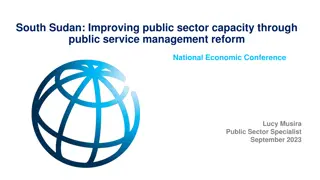Addressing Contemporary Challenges Through Law Reform
Emphasizing the importance of law reform in meeting present-day challenges, the discussion highlights the need for an independent Law Reform Commission and areas requiring review. Cautioning on the limitations of the law and the importance of balancing idealism with pragmatism, it stresses the crucial role of capable leaders in implementing effective reforms.
Download Presentation

Please find below an Image/Link to download the presentation.
The content on the website is provided AS IS for your information and personal use only. It may not be sold, licensed, or shared on other websites without obtaining consent from the author. Download presentation by click this link. If you encounter any issues during the download, it is possible that the publisher has removed the file from their server.
E N D
Presentation Transcript
REFORMING THE LAW TO MEET CONTEMPORARY CHALLENGES Emeritus Professor Datuk Dr Shad Saleem Faruqi Tun Hussein Onn Chair, ISIS Malaysia 18 December 2020
INTRODUCTION As the year and the decade come to a close, we thank the Almighty for His many blessings. At the same time, we pray for riddance from the strong turbulence that buffets our nation s political, legal, social and economic shores. Some of the problems that are lapping at our feet are rooted in the past; some (like Covid-19) are global and extra-territorial in nature. Whatever the origin, it is for us to tackle the challenges with courage and imagination. 2
Reforming some of our laws, institutions and procedures will be one of the ways of meeting the felt necessities of the times. In this brief presentation, I wish most humbly to: 1. Propose the setting up of an independent Law Reform Commission or Institute, and 2. To highlight some areas of the law which have become ripe for review due to prevailing challenges. 3
THE LIMITS OF THE LAW In pushing for law reform a few words of caution need to be administered. First, there are limits to what the law can achieve. The law is just one, and not necessarily the most important, factor and force that moulds society. Beyond legal institutions, there are economic, religious, social, cultural and educational forces that play a crucial role in our lives. 4
These forces often operate independent of the law and can defeat or delay the best of laws and create a wide gap between legal theory and social reality. Second, institutions are as good as the people who administer them. Institutional or structural reforms cannot by themselves achieve integrity and efficiency in government. The need for able, honest and visionary leaders and public officers with integrity is just as important as proper institutions and procedures! 5
Third, in seeking reforms we must balance idealism with pragmatism. It is not what the law says, it is what it does that is important. Not only form but also functioning; not only content but also consequences must be measured. Fourth, many problems (like poverty, economic disparity and gender discrimination) are systemic and structural and require remedial approaches that are holistic. 6
A LAW REFORM COMMISSION The law must be kept dynamic and in tune with the times. The nature of the law is such that its whole body is potentially in need of periodic review. The task is so mammoth that no one institution can handle reconstruction of the law single-handedly. Judicial activism: In all common law countries judges expand the horizons of law by a creative, holistic interpretation of the seamless web that constitutes the law. Judicial reform is, however, piecemeal and dependent on the accident of litigation. 7
The AGC: The Attorney-Generals Office has a special law revision and law reform division. Ministries & Statutory Bodies: Individual Ministries often appoint ad hoc committees to draft legislative proposals. Statutory bodies like SUHAKAM generate scintillating proposals. NGOs: Many NGOs make valiant suggestions for law reform, mostly without much success. Despite their failure to achieve success, their deliberations are not all wasted. Sometimes down the road the seeds they plant lead to the greening of the landscape of ideas. Nevertheless their ad hoc, part-time efforts are not adequate to satisfy the demands of law reform in a modern society. 8
Parliament: Our Parliament can enact new legislation or amend or repeal existing laws to meet emerging needs. It can invite public participation at the committee stage. Sadly, due to lack of time, expertise and a very passive view of its constitutional role, our Parliament is content to play second fiddle to the executive in law-initiation and law reform. Legislation Committees, permitted by Standing Orders, are appointed very rarely. 9
An Independent Body: An independent Law Reform Commission or a Law Reform Institute, with a power to act on its own initiative as well as on a request from the Attorney-General or the Ministry of Justice, can do much to keep the streams of law flowing and healthy. The necessity for such a body can hardly be exaggerated. At the federal level, we have more than a thousand primary statutes and probably around 20,000 federal subsidiary legislations. At the State level, due to our federal system, the picture is more complex and crowded. 10
Tasks for the Commission: Almost always, a wide gap between the theory of the law and the reality on the ground is discernible. Periodically, this gap needs to be bridged by law reform. The Commission must review those Acts of Parliament that violate the supreme Constitution and its cherished human rights guarantees. Some legal provisions appear outdated when faced with the complexities of the new social, commercial and economic life. Others require revision to measure up to the technical innovations and globalization of the age. 11
Often, on a particular field there is a multiplicity of laws some of which clash with each other. This multiplicity points to the need for consolidation - i.e. bringing many similar statutes under one broad generic heading. For example, contract, sale of goods and hire purchase could well come under one consolidated Commercial Code. The variety of laws on education (and there are about 17 of them) could well be harmonized and put under one cover. 12
The Commission when appointed must exhibit some essential characteristics. It must be independent of the executive so that it can operate outside the political agenda of the government of the day and as an independent voice in the community. Its members must be drawn from all sections of the legal community including the judiciary, the Bar, the academia, the AG s office and law- trained persons serving as legal advisors to companies and corporations. The luminaries appointed must have expertise, tenure and a full-time job. They must be supported by fulltime research and administrative staff. 13
The Commissions approach must be inter-disciplinary, socio- legal and not confined to what is called lawyer s law. The Commission must explore the actual working of the law in practice. Its methodology must be consultative and implementation- minded. Community participation in law reform will achieve two purposes: feedback will be obtained and a sense of public ownership over the process of law-making will be fostered. Decisions in which people participate are decisions they are likely to respect. 14
The Commissions aim should be, not only to update and modernize, but also to simplify and localize the law to suit local needs and cater to local circumstances. Substance as well as procedure ought to be given equal weight. New and more effective methods for the administration of law ought to be devised. The remedial aspects of the law must not be ignored. Justice is not in legislation but in administration. Every Act of Parliament must contain provisions for a monitoring body to examine the law s actual operation in society and to suggest reforms. It is a matter of policy whether the Commission should be merely recommendatory or whether it must be given delegated legislative authority to convert its findings into subsidiary legislation subject to disallowance by Parliament. 15
Reforms must address the following urgent and impending threats to society: Political instability caused by party hopping legislators. Identity politics and the decline of social harmony. Endemic corruption, especially elite corruption. Need for a Freedom of Information Act Decline of all check and balance mechanisms and the rise of an uncontrolled executive. Serious discontent in federal-state relations with Sabah and Sarawak. 16
Eclipse of some human rights. Absence of sustainable development policies. Politicisation of the public services. 17
1. PARTY-HOPPING & POLITICAL INSTABILITY Anti-hopping law: Though party-hopping by mobile MPs and Assemblymen has been known in the past in States like Sabah (1994) and Perak (2009), this phenomenon has become so endemic lately that it is creating chronic political instability. It is causing the fall of elected governments every few months. In Perak, e.g., three governments have risen or fallen in 29 months. Results of general elections are nullified in backroom deals. Issues confronting the nation are given lesser attention than the struggle to retain power. Political ethics and political legitimacy are at an all-time low. Yet there is no law to control defections. Instead, the case of Nordin Salleh (1992) says that the right to defect is part of freedom of association in Art. 10(1)(c) of the Constitution. Amazingly the court gave insufficient importance to the constitutional provision in Art 10(2)(c) that the freedom can be restricted on several grounds including morality . 18
41 countries including Bangladesh, Fiji, India, Israel, Pakistan, Portugal, Singapore, Sri Lanka and Thailand have laws against party defections. In eight countries including Singapore, these laws are enshrined in the supreme Constitution. Though the pros and cons of anti-hopping laws are many, it is time for Malaysia to act against the political opportunism and corruption that underlie most political hoppings. The law to be framed must address the following issues: 1. What amounts to floor crossing? The answer varies from country to country and includes resignation by the legislator from his party; voting in Parliament against his party; or being expelled from his party. 2. What consequences to the hopper follow the floor crossing? 19
In some countries, the legislator is allowed to party hop but is disqualified from contesting the next election. In others, he may hop, but is not eligible to hold a cabinet post or an office of profit in the public sector for a number of years. In others, he must resign his seat but is allowed to return to the voters to seek a fresh mandate. It is recommended that as a mid-point between freedom of association and the duty to remain true to the trust reposed in him by the voters, our law should be amended to overturn the Nordin Salleh precedent and to require a resignation after which the party hopper must return to the voters to renew his mandate. Articles 10(2)(c) and 48(6) need to be looked into. 20
Limit the number of cabinet posts: A further measure to discourage mid-term aisle-crossings for corrupt purposes is to provide an upper limit to the number of cabinet appointments the PM may make. Though the Federal Constitution provides no maximum, most of our State Constitutions provide a limit on the number of EXCO members. It is proposed that the limit should be no more than 10% of the total number of MPs. Broaden the definition of office of profit : MPs are disqualified from holding an office of profit (Article 48(1)(c)). Unfortunately, the term is defined so narrowly in Article 160(2) that only a whole-time office in any of the public services enumerated in Article 132 is forbidden. This allows the government to offer lucrative position in GLCs, statutory bodies and quangos to MPs in return for support. 21
Budget defeats: It is a constitutional requirement in Articles 96, 99 and 100 that governments apply annually to Parliament for raising and spending of money. It is also believed that a binding convention exists that a defeat on the budget amounts to a vote of no confidence. Budget time is, therefore, a time of great uncertainty for the government s survival. Perhaps the Constitution should be amended to allow an elected government to present Supply Bills and Finance Bills every two or three years instead of annually. 22
2. DECLINE OF SOCIAL HARMONY For decades Malaysia was an exemplar of peaceful and harmonious relations amongst its dazzlingly diverse population. Our Constitution was a masterpiece of moderation and compromise and showed consciousness of the social, economic, political and ethnic realities of our land. But there has been a lot of regression in Peninsular Malaysia. The spirit of the Constitution has been compromised. Racism and religious bigotry are replacing the admirable centuries old Malay tradition of inclusiveness and moderation. Sabah and Sarawak are, fortunately, different and supply useful paradigms for inter-communal relations. 23
National Harmony Act: Up to now we were relying primarily on political power- sharing and economic inter-dependence to build bridges of understanding. It is now time to also utilize the law to restore mutual respect and tolerance. A National Unity and Integration Commission Act or a National Harmony Act (by whatever name called) can be enacted to provide for : (1) Positive engagements between the races, religions and regions. (2) Conciliation procedures when disputes arise. This approach may be an alternative to the sledgehammer of laws like the Sedition Act and the Penal Code. (3) Penalties, not necessarily criminal, when conciliation fails. Many model laws exist e.g. in the UK and Singapore which can provide us with a blueprint. 24
Rukun Negara as a Preamble to the Constitution: The proposal made by a group of citizens a few years ago to incorporate the Rukun Negara into our Constitution as a Preamble should be reconsidered. The five principles of the Rukun Negara are well known but not the five stirring objectives which are very relevant to our present situation of frayed relations. unity a democratic way of life a just society where the prosperity of the country can be enjoyed together in a fair and equitable manner A liberal approach towards our rich and varied cultural traditions, and A progressive society that will make use of science and modern technology. 25
3. ENDEMIC AND BRAZEN CORRUPTION Corruption in the public services has become a serious problem. One area of concern is civil servants doing favours in return for lucrative positions in the sector after retirement. Regrettably, there is no rule barring a civil servant from working for a prohibited period in an industry connected with his official work There should be a separation of the offices of the Attorney General and the Public Prosecutor. This will require an amendment to Art. 145(3). The fused roles of the Attorney General and the Public Prosecutor must be reviewed. Since the Attorney General acts in the best interest of the government and the Public Prosecutor in the interest of the public and criminal justice, conflicts of interest arise when there is a need to prosecute Ministers or public servants. 26
The Malaysian Anti-Corruption Commission (MACC) was established under the Malaysian Anti-Corruption Act 2009 as an independent, transparent and professional body to manage the nation's anti- corruption efforts. However, till 2018 the MACC was ineffective in eradicating corruption. This resulted in a loss of public confidence. Reforms are needed for the MACC to function independently with established structural protection from executive control. 27
The Anti-Corruption Commission should be upgraded to constitutional status. It should report directly to Parliament and not be subjected to the jurisdiction of any government ministry. The present rule for it to obtain the AG s permission under Art. 145 to prosecute a case must be abolished. The MACC should have its own independent prosecution powers. Amendments to related laws such as the MACC Act, the Whistleblower Protection Act 2010 and the Witness Protection Act 2009 are also recommended. We need a Government Procurement Act to regulate tenders. 28
Whistleblowers Protection Act 2010: This Act provides protection to whistleblowers who report or reveal corruption activities or other wrongdoing. The identity of the whistleblower and the information provided are kept confidential. The whistleblower is given immunity from any civil, criminal or disciplinary action for revealing the act of corruption in the public or private sector. The main limitation of the law is that the disclosure that is protected must be to the relevant Enforcement Agency. If it is to a non-enforcement agency, there is no protection. 29
4. NEED FOR MORE OPENNESS AND TRANSPARENCY IN GOVERNMENT To promote good governance, participatory democracy and to combat corruption, we need a more open and transparent government especially in such areas as government tenders. Right to know: Regrettably, our Constitution does not anywhere confer this right. However, there are scholarly and judicial opinions that the right to know is implicit in the Constitution s right to speech and expression. This idea of derivative, implied, non-textual and unenumerated rights is known to many legal systems and is the result of a prismatic interpretation of the right-conferring clause of the Constitution. 30
Official Secrets Act (OSA): Instead of a right to know we have an Official Secrets Act imposing a duty to stay away from all classified information. While it is undeniable that some government information must remain confidential, the catch-all provisions of the OSA must be tested on the anvil of Art.10(2) which permits restrictions on free speech on only 8 enumerated grounds. However, the OSA bans receipt, retention and release of all classified information even if it was classified for non-permissible objects. Some aspects of the OSA appear to be in violation of the supreme Constitution. 31
Freedom of Information Act: The OSA should be replaced with a Freedom of Information Act (FIA) which should allow citizens, on payment of a fee, to access information from all public authorities (federal, state and local) within a prescribed time frame. Refusal should be subject to appeal and to judicial review. Penang (2010) and Selangor (2011) have given us good illustrations of FIA laws. These state laws are, however, weakened by the federal OSA. Like the Schedule to the OSA, the FIA should state clearly the categories of information that cannot be released. However, the FIA should limit itself to the permissible grounds of Art 10(2)(a). The FIA should acknowledge the existence of valid laws and principles that constitutionally restrict the disclosure of information. Among these are: 32
Banking and Financial Institution Act Finance Companies Act Banking Act Criminal Procedure Code Data Protection Act Censorship laws like the Finas Act 1981 Malaysian Communication & Multi-Media Commission Act Laws on privacy, confidentiality and public interest privilege. 33
Media freedom: Media reform is important to ensure that the media is free to act responsibly in the public interest and hold the government to account. Reforms to the Malaysian Communications and Multimedia Commission (MCMC) are vital. This body wields wide powers involving billion-ringgit industries and plays a key regulatory role impacting the public's ability to access information and communications services 34
Reforms are therefore required to make the MCMC more independent, transparent and accountable. These include reforms to the appointments process and removal of the Minister's powers to issue directions to the MCMC. 35
5. DECLINE OF ALL CHECK AND BALANCE INSTITUTIONS The Constitution and laws have created a number of check and balance institutions and procedures. Among the institutions are the Parliament, the courts, the Attorney-General, the Auditor-General, the Election Commission, the police force and a host of Commissions and Councils under the Constitution. Regrettably, many of them have failed to perform their functions satisfactorily. Parliament: It is supposed to keep the executive accountable and answerable and to scrutinise national finance. To enhance Parliament s efficacy, the following legal initiatives can be undertaken: An Institute of Parliamentary Affairs should be set up to train and assist MPs. 36
An independent law reform commission should be set up that reports to Parliament. We should have one or more ombudsmen/muhtasib who report to Parliament as in the UK. The electoral process through which Parliament is elected arouses no confidence. A Royal Commission of Inquiry must be appointed to look into the 'first past the post' electoral system. There are no ideal electoral systems and a mixture of many systems may be worthy of consideration. 37
The introduction of automatic voter-registration and lowering of the voting age to 18 has already been accomplished. Improvements to rules about absentee voting are now needed Regulation of political financing is an urgent need. Strengthening of democracy is required by re-introduction of local government elections. It creates a bad impression that the law in Article 48(4) permits MPs who are convicted of serious crimes to continue to sit in Parliament because their appeal or petition for pardon is pending. If civil servants, being tried for an offence or convicted of an offence suffer interdiction or suspension, then MPs should suffer like treatment. That would honour equality before the law. 38
The Judiciary: The Judicial Appointments Commission Act for filtering superior court appointments and promotions must be constitutionalized. Regrettably, the recommendations of the Commission are not binding on the PM. This means that despite a multi-tiered process of consultation, in practice, the PM has the final say over judicial appointments. A host of laws contain ouster clauses seeking to exclude judicial review. Ouster clauses should have no place in a constitutional state in which Parliament is not supreme. 39
6. DISCONTENT IN SABAH AND SARAWAK West Malaysian leaders must take note of the serious discontent in Sabah and Sarawak over the perceived violation of their negotiated 1963 rights; issues of income sharing; and cultural, religious and linguistic autonomy. Tensions in federal-state relations are entirely normal and need to be handled in a spirit of accommodation. 40
7. NEED TO STRENGTHEN HUMAN RIGHTS There should be implementation of the outstanding recommendations of the 2005 Royal Commission of Inquiry into the Police, including the establishment of an Independent Police Complaints and Misconduct Commission. Regrettably the Bill before Parliament is too watered down. The problem of forced disappearances indicates that in some areas we have a state within a state that can thwart the law and accountability. The de-politicisation of the police, as well as the development of a human rights culture in the police are absolutely necessary. Constitutional and human rights literacy need to be improved in police training. 41
The government must address issues in the Immigration Department like smuggling and human trafficking. It must establish the facts behind the Wang Kelian migrant 'death camps'. 42
Though many strides have been made, gender equality remains a distant dream. Despite Art 8(2) laws on citizenship and native status openly discriminate against women. For example, children born abroad to Malaysian women are not granted citizenship rights. Malaysia is one of only 25 countries that does not grant equal rights to women in this area. Evidently there are 40,000 pending applications from Malaysian women seeking citizenship for their kids. born abroad. Beyond formal equality there is functional equality. The picture is far more unsatisfactory if social reality were taken into consideration. 43
Conflict of civil and syariah court jurisdiction must be resolved. The plight of the disabled must be noted. The Persons with Disabilities Act 2008 must be strengthened. Judicial decisions that human rights provisions of the Constitution do not apply in the private sector must be reversed. 44
Prisons and detention centres must be humanized. Orang Asli land rights must be protected. Art 8(5)(c) on the protection, well being and advancement of the aboriginal people has not been adequately utilized. Domestic violence, trafficking in women and children must be prevented and punished. The plight of stateless persons, asylum seekers and refugees must be remedied. The spouses and offsprings of the above require humane consideration. Children, often illegitimate, of foreign workers face difficult issues that have human rights implications. 45
Better studies are needed to measure extreme poverty and extreme inequality. The recent UN Report puts our poverty rate at 15% whereas official reports state it to be 0.4%. Perhaps it is extreme inequalities that are distorting the true picture of deprivation. I am reminded of the skeptical comment about statistics: if you have your head in the freezer and your feet in the oven, on the average you are quite comfortable . The Covid-19 storm has obviously affected all measurements. 46
As a non-economist all that I can say is that Malaysias political economy has definite structural problems. For example, NEP s 30% Bumi equity ownership target does very little for the non-equity owning Bumis. Due to covid-19 up to 25% SMEs are in danger of closure. Urban poverty and the problems of the ageing population require attention. These are significant human rights considerations. 47
8. NEED TO ADOPT SUSTAINABLE DEVELOPMENT POLICIES Growth for the sake of growth is the ideology of the cancer cell. Development policies and decisions that take no note of environmental considerations will in the long range destroy mankind. Environmental issues have human rights implications and the plunder of nature for the benefit of the few must be prohibited. In some countries like India, courts are prepared to allow Public Interest Litigation and grant locus standi to applicants who go to court to protect their rivers and forests. Human rights theory today recognizes the rights of future generations. This gels in well with the imperatives of sustainable development policies. In some countries like UAE and Norway, sovereign funds have been established to save a certain percentage of the income from our natural resources for future generations. 48
9. POLITICIZATION OF THE PUBLIC SERVICES Constitutional Commissions act without independence: The Constitution has created many independent Commissions and Councils - among them the National Land Council (Article 91), National Council for Local Government (Article 95A), National Finance Council (Article 108), Election Commission (Article 114), Armed Forces Council (Article 137), Judicial & Legal Service Commission (Article 138), Public Services Commission (Article 139), Police Force Commission (Article 140), Education Service Commission (Article 141A). Regrettably, these constitutional bodies have become politicised and have lost their independence. 49
Lack of constitutional literacy: At all levels of the bureaucracy, this is a serious problem and needs to be addressed. Many civil servants prioritise policies over laws. Re Bin Abdullah. Many civil service circulars are in disregard of the Constitution or of the statutes involved. 50


